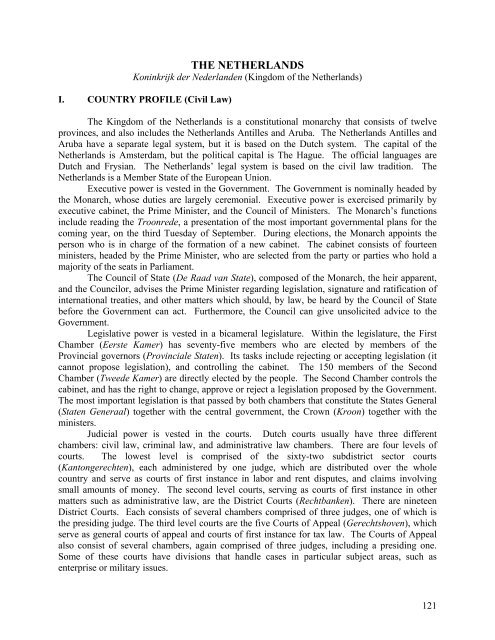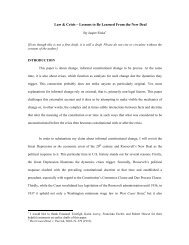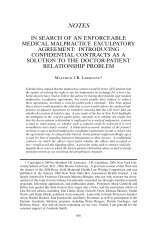Guide to Foreign and International Legal Citations - New York ...
Guide to Foreign and International Legal Citations - New York ...
Guide to Foreign and International Legal Citations - New York ...
You also want an ePaper? Increase the reach of your titles
YUMPU automatically turns print PDFs into web optimized ePapers that Google loves.
THE NETHERLANDS<br />
Koninkrijk der Nederl<strong>and</strong>en (Kingdom of the Netherl<strong>and</strong>s)<br />
I. COUNTRY PROFILE (Civil Law)<br />
The Kingdom of the Netherl<strong>and</strong>s is a constitutional monarchy that consists of twelve<br />
provinces, <strong>and</strong> also includes the Netherl<strong>and</strong>s Antilles <strong>and</strong> Aruba. The Netherl<strong>and</strong>s Antilles <strong>and</strong><br />
Aruba have a separate legal system, but it is based on the Dutch system. The capital of the<br />
Netherl<strong>and</strong>s is Amsterdam, but the political capital is The Hague. The official languages are<br />
Dutch <strong>and</strong> Frysian. The Netherl<strong>and</strong>s’ legal system is based on the civil law tradition. The<br />
Netherl<strong>and</strong>s is a Member State of the European Union.<br />
Executive power is vested in the Government. The Government is nominally headed by<br />
the Monarch, whose duties are largely ceremonial. Executive power is exercised primarily by<br />
executive cabinet, the Prime Minister, <strong>and</strong> the Council of Ministers. The Monarch’s functions<br />
include reading the Troonrede, a presentation of the most important governmental plans for the<br />
coming year, on the third Tuesday of September. During elections, the Monarch appoints the<br />
person who is in charge of the formation of a new cabinet. The cabinet consists of fourteen<br />
ministers, headed by the Prime Minister, who are selected from the party or parties who hold a<br />
majority of the seats in Parliament.<br />
The Council of State (De Raad van State), composed of the Monarch, the heir apparent,<br />
<strong>and</strong> the Councilor, advises the Prime Minister regarding legislation, signature <strong>and</strong> ratification of<br />
international treaties, <strong>and</strong> other matters which should, by law, be heard by the Council of State<br />
before the Government can act. Furthermore, the Council can give unsolicited advice <strong>to</strong> the<br />
Government.<br />
Legislative power is vested in a bicameral legislature. Within the legislature, the First<br />
Chamber (Eerste Kamer) has seventy-five members who are elected by members of the<br />
Provincial governors (Provinciale Staten). Its tasks include rejecting or accepting legislation (it<br />
cannot propose legislation), <strong>and</strong> controlling the cabinet. The 150 members of the Second<br />
Chamber (Tweede Kamer) are directly elected by the people. The Second Chamber controls the<br />
cabinet, <strong>and</strong> has the right <strong>to</strong> change, approve or reject a legislation proposed by the Government.<br />
The most important legislation is that passed by both chambers that constitute the States General<br />
(Staten Generaal) <strong>to</strong>gether with the central government, the Crown (Kroon) <strong>to</strong>gether with the<br />
ministers.<br />
Judicial power is vested in the courts. Dutch courts usually have three different<br />
chambers: civil law, criminal law, <strong>and</strong> administrative law chambers. There are four levels of<br />
courts. The lowest level is comprised of the sixty-two subdistrict sec<strong>to</strong>r courts<br />
(Kan<strong>to</strong>ngerechten), each administered by one judge, which are distributed over the whole<br />
country <strong>and</strong> serve as courts of first instance in labor <strong>and</strong> rent disputes, <strong>and</strong> claims involving<br />
small amounts of money. The second level courts, serving as courts of first instance in other<br />
matters such as administrative law, are the District Courts (Rechtbanken). There are nineteen<br />
District Courts. Each consists of several chambers comprised of three judges, one of which is<br />
the presiding judge. The third level courts are the five Courts of Appeal (Gerechtshoven), which<br />
serve as general courts of appeal <strong>and</strong> courts of first instance for tax law. The Courts of Appeal<br />
also consist of several chambers, again comprised of three judges, including a presiding one.<br />
Some of these courts have divisions that h<strong>and</strong>le cases in particular subject areas, such as<br />
enterprise or military issues.<br />
121
















